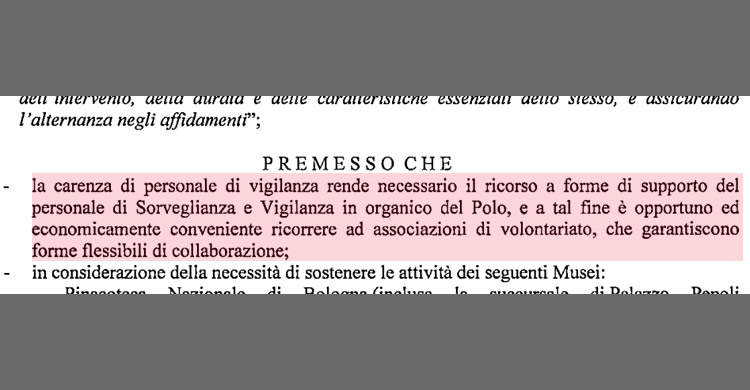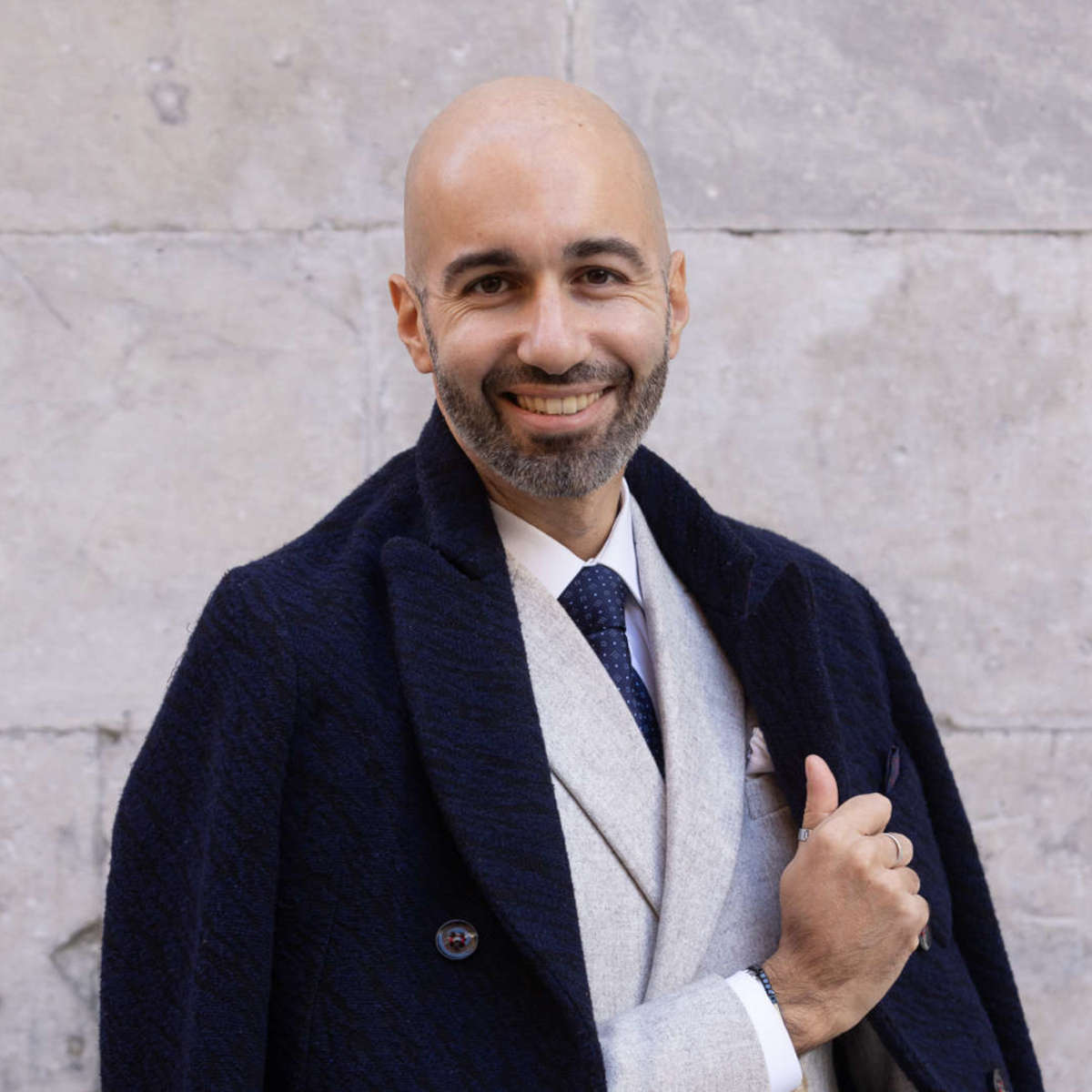Until not so long ago, few would have admitted that fake volunteering in cultural heritage is thought to be a great way to replace stable, paid work when needed. And almost no one, of course, would have put it in writing. It was mostly a hallway argument: when you happened to cross paths with an official or director at some exhibition or during a museum visit and ended up on the subject, the refrain was roughly always the same: “we don’t have resources to afford to hire professional staff, so we have to use volunteers.” Well: we will remember this 2019 as the year when this last taboo also fell: now there is no longer any hiding behind a finger, and the fact that the sector is in dire need of free labor to fill staffing gaps is no longer a reality that everyone knows but few want to accept. It is now a need that has been put down on paper in an official act.
It happened a few days ago, when the Polo Museale dell’Emilia Romagna (an entity that brings together some of the most valuable museums in the region, starting with the Pinacoteca Nazionale in Bologna and continuing with the Basilica of Sant’Apollinare in Classe in Ravenna, the Abbey of Pomposa, the Archaeological Area of Marzabotto and several others) has launched an expression of interest for voluntary collaboration in whose announcement candidly admits that “the shortage of supervisory staff makes it necessary to resort to forms of support of the pole’s staff of surveillance and vigilance, and for this purpose it is appropriate and economically convenient to resort to voluntary associations, which guarantee flexible forms of collaboration.” Obviously, reading these few lines, the first fact that emerges is the absurdity of the situation in which we are plunged, such that a state body, moreover endowed with autonomy, namely the Polo Museale dell’Emilia Romagna, certifies in a public act that aninsane, desulting, shameful, unreasonable, humiliating and pernicious competition based on mere economic aspects is now in full swing between workers and volunteers. By now, it is no longer a matter of looking for volunteers to support staff in unskilled tasks: the announcement states that the search is aimed at seeking operators who, among other activities, will be responsible for supporting accompanied visits, educational activities, collaboration in projects “aimed at documentation, consultation, conservation and management of venues, reworking and cataloging of data, images and materials or for the enhancement of museums,” collaboration in the organization of events and exhibitions. These are all tasks that should involve the hiring (or at most professional collaboration) of trained, prepared figures with solid cultural, academic and work backgrounds. But evidently deemed unworthy of being adequately paid, as, moreover, the constitutional dictate would also have it: are cultural professionals therefore being told that their work is not worth anything and that it can easily be replaced, for pure reasons of economic convenience, by that of operators of voluntary associations?
 |
| The excerpt from the notice of the Polo Museale dell’Emilia Romagna on the cost-effectiveness of volunteering |
But there is a further, equally damaging result: the profound distortion of the mission of volunteering which, it would be good to remember, in the Framework Law on Volunteering of 1991, is defined as that activity “performed in a personal, spontaneous and free way, through the organization of which the volunteer is a member, without the purpose of profit even indirectly and exclusively for purposes of solidarity.” And it is equally appropriate to note that there is no solidarity purpose in trying to solve staff shortage problems by resorting to associations that, by statute, should pursue charitable purposes. There is no prejudice against the use of volunteers in cultural heritage, but the issue takes a completely different form if the use (and abuse) of volunteerism is a means of saving money on professional and qualified staff, or of coping with the unavailability of resources: confusion of roles ensues, serious damage to the quality of work (saving on staff is tantamount to less care for results, and above all, a staff that does not receive pay is a much less loyal staff), and equally serious consequences both for professionals who are already in the market (who, with sum mortification of their professional paths, must launch themselves into a competition to the bottom, and obviously with a foregone conclusion, with those who are willing to agree to work for free), and for those who must enter the market instead (first because doing so delays professional maturation, then because, contrary to popular belief, volunteering should not make a resume, and again because unpaid and fragmented experiences are far more harmful than people think).
Of course, the crackdown that the minister of cultural heritage, Alberto Bonisoli, promised in an interview in Finestre Sull’Arte in March and announced at the end of May finally arrived in early June: however, beyond the fact that the measures would seem not to have yielded, at least at the moment, particularly appreciable results (the Emilia Romagna Polo Museale’s announcement proves this), it must be added that the problem now no longer concerns only the ministry, but is spreading with impressive and worrying speed and diffusion. In the last two months alone, we have recorded a call from the University of Verona looking for “young people, enthusiasts or curious about the art world who will be specially trained to guide visits” of a contemporary art exhibition that will open in September (they will, of course, be volunteers), the search for volunteers by the Museum of the Great Rivers in Rovigo to allow the opening of the institute on holidays and pre-holidays, the call for hospitality at the Fortress of Le Castella with operators paid 3.78 euros per hour, the training course for volunteer operators “in charge of the custody, protection and enhancement of buildings of worship and ecclesiastical cultural heritage” in Lanciano, and even the case of the Municipality of Senigallia seeking, for its museum, a director who works for free.
And as a result, stemming this continuous tide becomes increasingly difficult: for a call for bids for which we get revocation (the most recent episode is that of the search for volunteers at the Angelica Library, withdrawn following the case raised by our magazine and the movement Do you recognize me? I’m a cultural heritage professional) there are many others coming, and from different rivulets (seen above: emanations of the Ministry of Cultural Heritage, universities, municipalities, church bodies). Perhaps, placing a few more stakes is not sufficient measure: what would be needed, if anything, is a clear and drastic law, preventing and punishing abuses. A proposal to this effect was made last year, but it was never discussed again. Similarly, the reform of the ministry ventilated in June (and which would seem to be blocked for now) does not pose the problem, but in this case it would perhaps be appropriate to intervene on the solidaristic mechanisms between state museums (evaluating, of course, on a case-by-case basis), since there is still an imbalance between the large autonomous museums and the peripheral museums. It would be good to insist, because the situation has become intolerable and no longer sustainable-it is time to do something concrete.

The author of this article: Federico Giannini
Nato a Massa nel 1986, si è laureato nel 2010 in Informatica Umanistica all’Università di Pisa. Nel 2009 ha iniziato a lavorare nel settore della comunicazione su web, con particolare riferimento alla comunicazione per i beni culturali. Nel 2017 ha fondato con Ilaria Baratta la rivista Finestre sull’Arte. Dalla fondazione è direttore responsabile della rivista. Nel 2025 ha scritto il libro Vero, Falso, Fake. Credenze, errori e falsità nel mondo dell'arte (Giunti editore). Collabora e ha collaborato con diverse riviste, tra cui Art e Dossier e Left, e per la televisione è stato autore del documentario Le mani dell’arte (Rai 5) ed è stato tra i presentatori del programma Dorian – L’arte non invecchia (Rai 5). Al suo attivo anche docenze in materia di giornalismo culturale all'Università di Genova e all'Ordine dei Giornalisti, inoltre partecipa regolarmente come relatore e moderatore su temi di arte e cultura a numerosi convegni (tra gli altri: Lu.Bec. Lucca Beni Culturali, Ro.Me Exhibition, Con-Vivere Festival, TTG Travel Experience).
Warning: the translation into English of the original Italian article was created using automatic tools. We undertake to review all articles, but we do not guarantee the total absence of inaccuracies in the translation due to the program. You can find the original by clicking on the ITA button. If you find any mistake,please contact us.